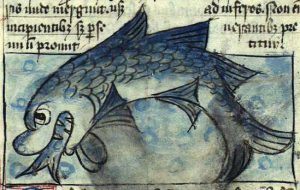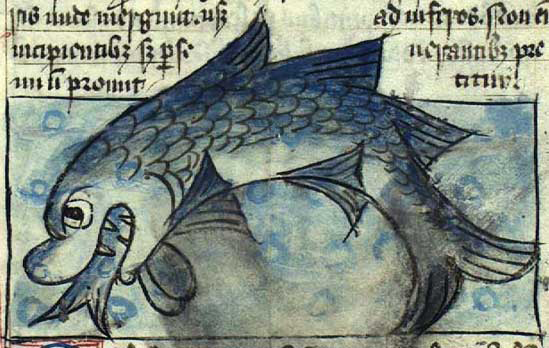
 An image of a dolphin from Kongelige Bibliotek, Gl. kgl. S. 1633 4º, Folio 60v
|
The age of modern scientific study of dolphins, whales and other animals probably started around the 18th century. Before that time period, what did the average person on the street know about whales and dolphins and how did they come by this information? In today’s science spotlight, we will be speaking with Dr. Ranke de Vries, lecturer in Celtic Studies at Utrecht University in the Netherlands. Dr. de Vries studies ancient manuscripts from medieval periods.
|
Dolphin official olympic mascot, Hayden Panettiere receives Wyler prize
[ms_audio style=”light” mp3=”https://www.dolphincommunicationproject.org/wp-content/uploads/2022/05/thedolphinpod8dolphinpodnews.mp3″ ogg=”” wav=”” mute=”” loop=”” controls=”yes” class=”dcp-embed-mp3″ id=””]
Dolphin chosen as official mascot of the 2014 Olympics in Sochi
The people of the southern Russian city of Sochi have chosen the dolphin as the official mascot of the 2014 winter Olympics. The vote was held on March 2nd. Over 130 different ideas were submitted as possible mascots. Sochi was chosen to host the 2014 Olympics last year, and this will be the first time that Russia will host the winter Olympics.
************************
Hayden Panettiere to be honored for her work raising awareness of dolphin conservation
Heroes actress Hayden Panettiere will receive the Wyler prize at the upcoming Genesis Awards on March 29th organized by the Humane Society of the United States. The director of the human society stated that “She’s an inspiring example to her generation, using her compassion, courage and celebrity to help animals in a very effective way.” Panettiere made the news last year after being involved in a high profile protest in the town of Taiji, where a large dolphin hunt takes places each year. Last year’s winner of the Wyler prize was Sir Paul McCartney.
************************

Dolphins and whales in the Middle Ages
Listen to the interview:
[ms_audio style=”light” mp3=”https://www.dolphincommunicationproject.org/wp-content/uploads/2022/05/thedolphinpod8sciencespotlight.mp3″ ogg=”” wav=”” mute=”” loop=”” controls=”yes” class=”dcp-embed-mp3″ id=””]
The age of modern scientific study of dolphins, whales and other animals probably started around the 18th century. Before that time period, what did the average person on the street know about whales and dolphins and how did they come by this information? In today’s science spotlight, we will be speaking with Dr. Ranke de Vries, lecturer in Celtic Studies at Utrecht University in the Netherlands. Dr. de Vries studies ancient manuscripts from medieval periods.
More information and links:
Link to Aberdeen bestiary:
http://www.abdn.ac.uk/bestiary/
The Medieval Bestiary – animals in the Middle Ages:
http://bestiary.ca/
On this page you can find links to bestiaries and to secondary literature.
Medieval Writing – bestiaries:
http://medievalwriting.50megs.com/word/bestiary.htm
Information on whales and dolphins in early Irish society:
Fergus Kelly, Early Irish Farming, Early Irish Law Series IV, Dublin, Dublin Institute for Advanced Studies, 1997, ISBN 1 85500 180 2
************************

Magnetite
Kids’ Science Quickie: [ms_audio style=”light” mp3=”https://www.dolphincommunicationproject.org/wp-content/uploads/2022/05/thedolphinpod8kidsciencequickie.mp3″ ogg=”” wav=”” mute=”” loop=”” controls=”yes” class=”dcp-embed-mp3″ id=””]
Have you ever heard of magnetite? Magnetite is a naturally occurring mineral that reacts to magnetic fields. Scientists believe that many animals may have small amounts of magnetite in their brains, allowing them to sense magnetic fields produced by the earth. Animals like bats and birds (especially pigeons) are thought to navigate large distances without using any clues as to where they are other than the presence and shape of magnetic fields which they can sense using the magnetite in their brains. Whales and dolphins too are thought to have small amounts of magnetite in their brains allowing them to navigate enormous distances across the oceans. Scientists also suspect that some whales and dolphins may strand when the earth’s magnetic fields fluctuate beyond their normal position. Navigating by the magnetic fields they have used their entire lives, whales and dolphins may think that they are in the open ocean, but in reality they are dangerously close to shore. It would be a lot like trying to navigate your living room with a blindfold on after someone had moved around all of your furniture. Even humans have a small amount of magnetite in their brains, so the next time you trip over your shoelaces, you can blame it on fluctuating magnetic fields…

Magnetite
************************
![]()
What’s the main difference between the blowhole of a bottlenose dolphin and the blowhole of a humpback whale?
[ms_audio style=”light” mp3=”https://www.dolphincommunicationproject.org/wp-content/uploads/2022/05/thedolphinpod8dolphinquiz.mp3″ ogg=”” wav=”” mute=”” loop=”” controls=”yes” class=”dcp-embed-mp3″ id=””]
We had quite a few correct answers to last week’s quiz, and our winner (chosen at random) is Rebecca Frost who correctly stated that it was a trick question: dolphins do not have bones in their dorsal fins, only fibrous tissue. Now, for this week’s quiz: what’s the main difference between the blowhole of a bottlenose dolphin and the blowhole of a humpback whale? Think you know the answer?. Winners will randomly be chosen from the correct answers, and will be announced on next week’s show.
*********
Wrap-up:
That’s it for this week’s edition of The Dolphin Pod – thanks for tuning in. If you would like more information about the stories from this week’s episode, check out thedolphinpod.com. If you’ve got questions or comments about this week’s podcast episode, please contact us through the website. Why not consider signing up for the Dolphin Communication Project’s online community? You’ get access to a forum where you can discuss the The Dolphin Pod with other listeners. The DCP website offers a chance to adopt one of our dolphins from the Bahamas, as well as learn more about volunteer, internship and ecotour opportunities.
Don’t forget to join us next week for more dolphin science news and info. And remember, the dolphin pod is only a click away.
